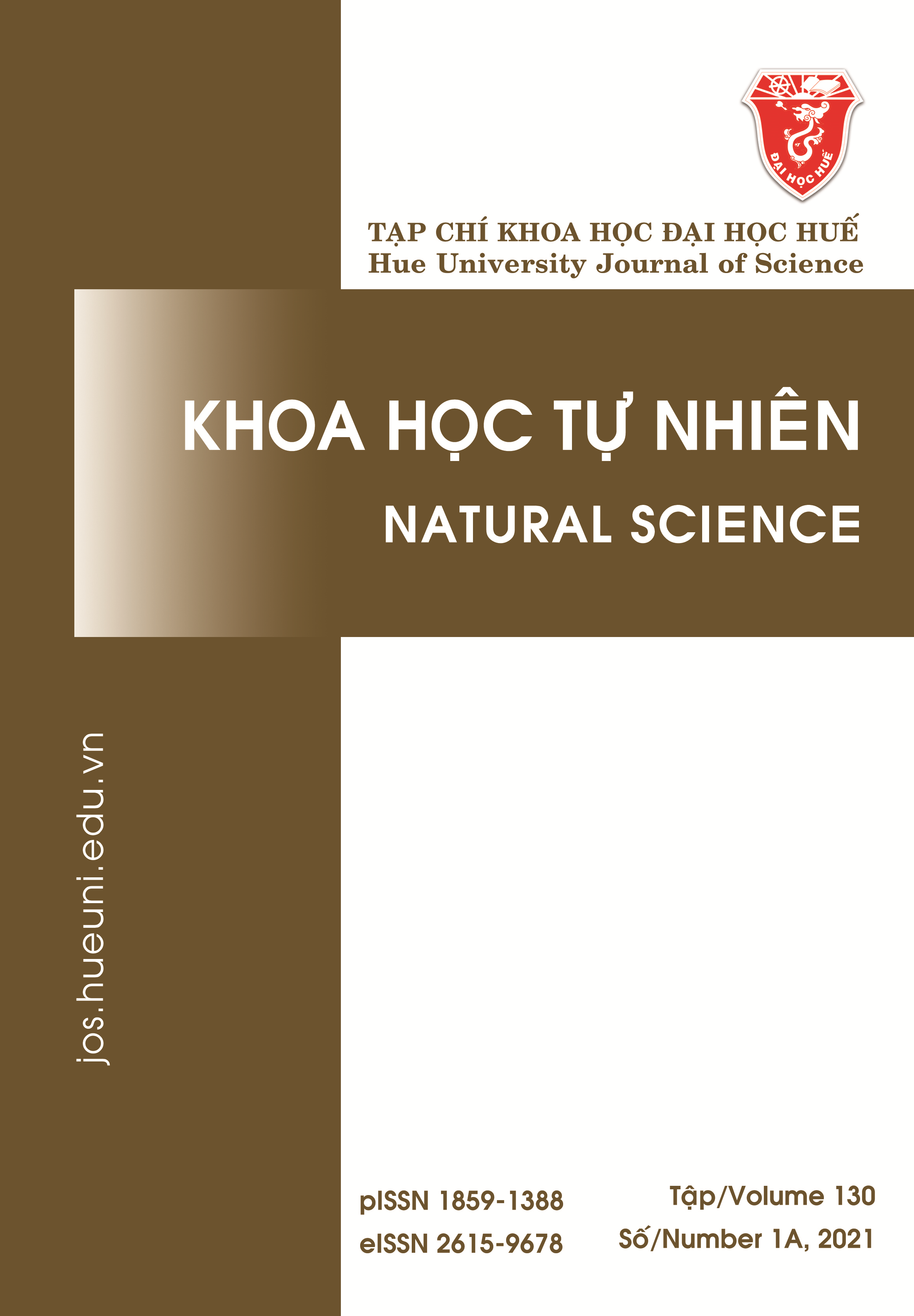Tóm tắt
Nghiên cứu này đánh giá ảnh hưởng của pH dung dịch, khối lượng than, thời gian và nồng độ ban đầu lên quá trình hấp phụ nitrate trong dung dịch của than sinh học sản xuất từ trấu (O. sativa L., OM5451). Than sinh học được sản xuất bằng phương pháp nhiệt phân trấu ở 700 °C. pHpzc của than là 9,51. Điều kiện tối ưu cho quá trình hấp phụ bao gồm khối lượng than 0,5 g, pH 4, thời gian 120 phút và nồng độ đầu 50 . Tại điều kiện tối ưu, hiệu suất loại là 69,7%. Dữ liệu cân bằng phù hợp với mô hình đẳng nhiệt Langmuir ( = 0,993) hơn mô hình Freundlich ( = 0,965). Dung lượng hấp phụ nitrate cực đại tính theo phương trình Langmuir là 12,843 mg·g–1. Sự hấp phụ của than sinh học phù hợp với cả hai mô hình động học biểu kiến bậc 1 ( = 0,964) và bậc 2 ( = 0,963).
Tài liệu tham khảo
- Nữ PV, Nga BT, Izumi T. Sử dụng nước thải túi ủ biogas có vật liệu nạp là phân heo và bèo tai tượng (pistia stratiotes) canh tác cây ớt (capsicum frutescens l.). Tạp chí Khoa học Trường Đại học Cần Thơ. 2015;35-40.
- Tổng cục thống kê Việt Nam. Diện tích và sản lượng lúa cả năm, Số liệu thống kê nông, lâm nghiệp và thủy sản. Hà nội: Nxb Thống kê; 2016.
- Budai A, Wang L, Gronli M, Strand LT, Antal MJ, Abiven S, et al. Surface Properties and Chemical Composition of Corncob and Miscanthus Biochars: Effects of Production Temperature and Method. Journal of Agricultural and Food Chemistry. 2014;62(17):3791-9.
- Basso AS, Miguez FE, Laird DA, Horton R, Westgate M. Assessing potential of biochar for increasing water-holding capacity of sandy soils. GCB Bioenergy. 2012;5(2):132-143.
- Cường TV. Nghiên cứu ứng dụng than sinh học từ phụ phẩm cây lúa để cải tạo môi trường đất xám bạc màu [Luận án], Hà Nội: Trường đại học khoa học tự nhiên - ĐHQG Hà nội; 2015.
- Nguyen LX, Do PTM, Nguyen CH, Kose R, Okayama T, Pham TN, et al. Properties of Biochars Prepared from Local Biomass in the Mekong Delta, Vietnam. Bioresources. 2018;13(4):7325-7344.
- Balistrieri L, Murray J. The surface chemistry of goethite (alpha FeOOH) in major ion seawater. American Journal of Science. 1981;281(6):788-806. DOI: https://doi.org/10.2475/ajs.281.6.788
- Zubair M, Mu’azu ND, Jarrah N, Blaisi N, Aziz HA, Al-Harthi MA. Adsorption behavior and mechanism of methylene blue, crystal violet, eriochrome black t, and methyl orange dyes onto biochar-derived date palm fronds waste produced at different pyrolysis conditions. Water Air and Soil Pollution. 2020;231(5). DOI: https://doi.org/10.1007/s11270-020-04595-x
- Al-Zoubi H, Zubair M, Manzar MS, Manda AA, Blaisi NI, Qureshi A, et al. Comparative adsorption of anionic dyes (eriochrome black t and Congo red) onto jojoba residues: isotherm, kinetics and thermodynamic studies. Arabian Journal for Science and Engineering. 2020;45(9):7275-7287. DOI: https://doi.org/10.1007/s13369-020-04418-5
- Bedia J, Peñas-Garzón M, Gómez-Avilés A, Rodríguez J, Belver C. A review on synthesis and characterization of biomass-derived carbons for adsorption of emerging contaminants from water. Journal of Carbon Research. 2018;4(4):63. DOI: https://doi.org/10.3390/c4040063
- Tan X, Liu Y, Zeng G, Wang X, Hu X, Gu Y, et al. Application of biochar for the removal of pollutants from aqueous solutions. Chemosphere. 2015; 125:70-85.
- Mai VT, Tuyên TV. Nghiên cứu khả năng xử lý amoni trong môi trường nước của than sinh học từ lõi ngô biến tính bằng H3PO4 và NaOH. Tạp chí Khoa học ĐHQGHN. 2016;32(1S):274-81.
- Chintala R, Mollinedo J, Schumacher TE, Papiernik SK, Malo DD, Clay DE, et al. Nitrate sorption and desorption in biochars from fast pyrolysis. Microporous and Mesoporous Materials. 2013;179:250-7.
- Zhao H, Xue Y, Long L, Hu X. Adsorption of nitrate onto biochar derived from agricultural residuals. Water Science and Technology. 2017;77(2):548-554. DOI: https://doi.org/10.2166/wst.2017.568
- Yang L, Yang M, Xu P, Zhao X, Bai H & Li H. Characteristics of Nitrate Removal from Aqueous Solution by Modified Steel Slag. Water. 2017;9(10):757. DOI: https://doi.org/10.3390/w9100757
- Fidel RB, Laird DA, Spokas KA. Sorption of ammonium and nitrate to biochars is electrostatic and pH-dependent. Scientific Reports. 2018;8(1). DOI: https://doi.org/10.1038/s41598-018-35534-w
- Deveci H, Kar Y. Adsorption of hexavalent chromium from aqueous solutions by bio-chars obtained during biomass pyrolysis. Journal of Industrial and Engineering Chemistry. 2013;19(1):190-6.
- Uddin MT, Islam M, Islam MA, Abedin M. Uptake of phenol from aqueous solution by burned water hyacinth. Polish Journal of Chemical Technology. 2008;10(2):43-9. DOI: https://doi.org/10.2478/v10026-008-0027-1
- Divband Hafshejani L, Hooshmand A, Naseri AA, Mohammadi AS, Abbasi F, Bhatnagar A. Removal of nitrate from aqueous solution by modified sugarcane bagasse biochar. Ecological Engineering. 2016;95:101-111. DOI: https://doi.org/10.1016/j.ecoleng.2016.06.035

công trình này được cấp phép theo Creative Commons Ghi công-Chia sẻ tương tự 4.0 License International .
Bản quyền (c) 2021 Array




